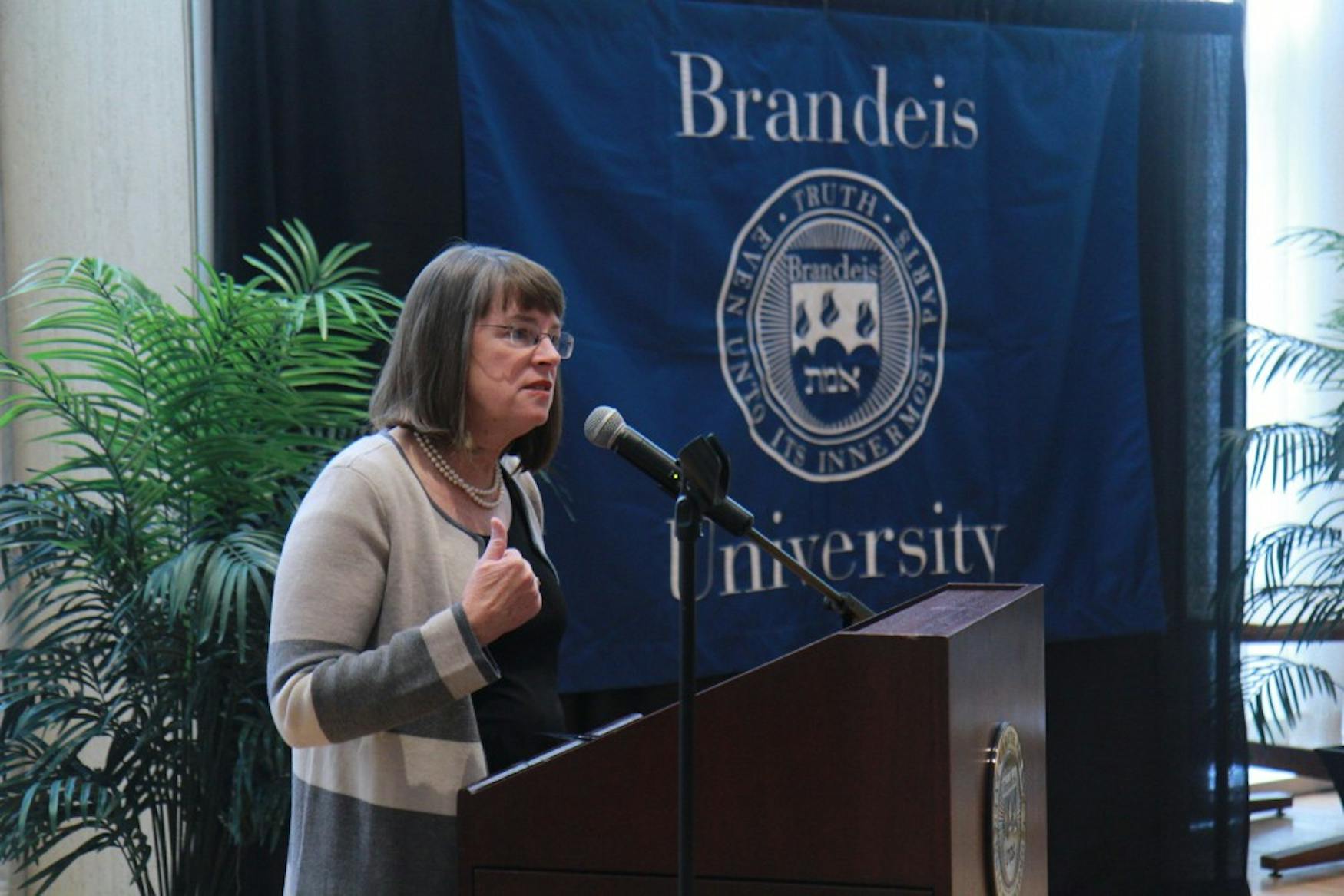Lynch celebrates student ambition in Fall Fest address
On Saturday morning, Interim University President Lisa Lynch welcomed parents to the annual Fall Fest activities by delivering the State of the University Address. In her address, Lynch highlighted what she believes sets Brandeis apart from other universities.
Lynch expressed her belief in the “unique” nature of the student body, highlighting that “as a professor, as a senior administrator at the University, what gives all of us on this campus, faculty and staff, such joy is the privilege of working with your child — our student — every day.”
She began the talk with an overview of the campus’s history, highlighting the University’s unique founding. She noted that the University’s dedication to teaching students to create evidence-based policy as can be seen in the development of the Health, Science and Social Policy Program, is a manifestation of Justice Louis D. Brandeis’s “Brandeis brief,” which introduced data and critical analysis to legal decisions. Another testimony to the University’s dedication to justice, Lynch noted, is Justice Ruth Bader Ginsberg’s upcoming visit to campus in honor of the 100th anniversary of Brandeis’s nomination to the Supreme Court.
Lynch highlighted the fact that Albert Einstein, who played a large role in establishing the university, pushed for the University to be named after Justice Brandeis because “he said that Brandeis is a name that can not be merely adopted; it is one that must be achieved.” According to Lynch, “Every day we are challenged here on this campus to sort of do justice, if you will, to the name of Justice Brandeis.” The rest of Lynch’s address was dedicated to discussing ways to “[meet] the Einstein challenge of achieving all we should achieve as a University named after Brandeis.”
In elaborating on the student experience at Brandeis, Lynch highlighted a variety of programs and attributes that help students excel — both inside the classroom and out. She spoke of the relationships students foster with each other, acknowledging that, “what’s different about Brandeis is, and I say this not only as a president but as a mother of a student … is how the students are really challenged, … [but] the atmosphere in which the students are being challenged is really a very supportive one. It is not a cut-throat environment.” Additionally, she noted, “Students are pushing themselves hard, but they are pushing themselves together and they’re supporting each other.”
Lynch also highlighted the unique opportunities that can be afforded due to the University’s status as “a liberal arts college based in a research university.” Students are exposed to a breadth of classes meant to prepare them for their life as critical thinkers and active citizens, she stated. Lynch also expressed pride in the “extra things that we do” as faculty, specifically mentioning programs like Justice Brandeis Semesters, the Spring Semester in the Hague program and the Summer in Sienna Program.
In addressing the quality of the faculty, Lynch mentioned professors and administrators who have recently received awards, noting that many faculty members take pleasure in interacting with the student body and developing relationships that allow for student-faculty collaboration.
Lynch mentioned how impressive the student body is in its interactions with the greater Waltham community, noting that Brandeis was recently named the first in community service by the Princeton Review, with over 1,500 students having completed over 45,000 hours of community service in the town of Waltham alone.
Finally, Lynch challenged parents to embolden their children to be curious and challenge themselves. She implored parents to “encourage them to stretch themselves” academically and try new classes outside their usual comfort zone. She also reiterated the importance of self-care, voicing her concern that sometimes students do not always know that “you can’t just live on Doritos for a week.” She expressed the importance of teaching students to advocate for themselves and told parents that it is OK to “let go,” acknowledging that, as a mother, she knows how difficult it can often be to take a step back and allow children to grow independently.
In the question-and-answer portion of the event, Lynch mentioned that the University has not yet found a permanent president. She also stated that she was not being considered as a candidate and that she will return to her role as provost once a new p resident is announced next semester and assumes office sometime thereafter.
She also briefly addressed the financial costs inherent to higher education, noting that it is sometimes difficult to be a younger university that competes with Ivy League schools with only a fraction of their endowment.
She said she recognizes that the University cannot afford for the cost of education to determine whether or not students will be able to afford higher education. Last year, she said, the University gave out over 60 million dollars in financial aid, with the endowment only covering 17 percent of that sum. She noted that it was the University’s prerogative to “invest in faculty, not dorms,” a statement that garnered a round of applause from the parents.



Please note All comments are eligible for publication in The Justice.